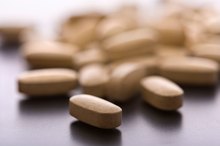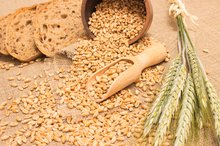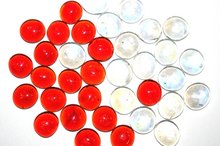Foods to Eat for Low Blood Count
A low blood count, also known as anemia, is a lower than usual number of red blood cells in your body. Anemia is particularly common among older individuals. The National Anemia Action Council states about 10 percent of adults over 65 years old have this condition, and more than 50 percent of people in nursing homes have low blood counts. Ask your doctor about the merits and drawbacks of diet and nutrition in treating this health problem.
Anemia Info
Greater than 30 percent of the global population is anemic, reports the World Health Organization. In most cases, iron deficiency is responsible for decreased red blood cell numbers. Other possible causes of a low red blood cell count include genetics, the use of certain medications, being pregnant and having certain chronic health conditions, including kidney failure, cancer and ulcerative colitis. If you suffer from anemia, you may experience fatigue and shortness of breath. You may also develop headaches, dizziness, chest pain and difficulty concentrating.
- Greater than 30 percent of the global population is anemic, reports the World Health Organization.
- If you suffer from anemia, you may experience fatigue and shortness of breath.
Beneficial Foods
Foods That Help Plantar Fasciitis
Learn More
In many cases, notes medical doctor Alan R. Gaby, author of "The Natural Pharmacy," severe protein deficiency is a leading cause of anemia, especially among people living in developing nations. High-protein foods, such as herring, salmon and sardines, may be helpful. Other beneficial foods in treating your anemia may include okra, parsley, asparagus, broccoli, egg yolks, bananas, apples, apricots, enriched cereals and dark leafy green vegetables. Foods high in vitamin C -- oranges, strawberries, bell peppers -- may also be helpful.
- In many cases, notes medical doctor Alan R. Gaby, author of "The Natural Pharmacy," severe protein deficiency is a leading cause of anemia, especially among people living in developing nations.
- Foods high in vitamin C -- oranges, strawberries, bell peppers -- may also be helpful.
Featured Food
Oranges may be one of the most useful foods in treating your anemia. According to nutritionist and biologist George Mateljan, author of "The World's Healthiest Foods," oranges contain significant amounts of vitamin C, dietary fiber, folate, vitamins A and B1, potassium and calcium. Vitamin C, notes the National Heart Lung and Blood Institute, helps your body absorb iron, which may be particularly helpful in treating iron deficiency anemia. Oranges have historically been used in treating anemia, promoting heart health and reducing inflammation within your body.
- Oranges may be one of the most useful foods in treating your anemia.
- Vitamin C, notes the National Heart Lung and Blood Institute, helps your body absorb iron, which may be particularly helpful in treating iron deficiency anemia.
Considerations
What Are the Dangers of Being Anemic?
Learn More
Because there are numerous possible causes of a low red blood cell count, it is important to visit your primary care provider for a thorough examination if you develop the characteristic signs and symptoms of this condition. A qualified healthcare practitioner can counsel you on the risks, benefits and limitations of natural treatment methods and inform you about other, more conventional treatment methods to help resolve your anemia. Some foods traditionally used in treating this condition may require a larger body of scientific research evidence to examine their true health effects.
Related Articles
References
- "The Natural Pharmacy"; Alan R. Gaby, M.D.; 2006
- "The World's Healthiest Foods"; George Mateljan; 2007
- National Heart Lung and Blood Institute: Anemia
- MedlinePlus. Anemia. Updated December 10, 2019
- Cappellini MD, Comin-colet J, De francisco A, et al. Iron deficiency across chronic inflammatory conditions: International expert opinion on definition, diagnosis, and management. Am J Hematol. 2017;92(10):1068-1078. doi:10.1002/ajh.24820
- American Society of Hematology. Anemia.
- Alexiusdottir KK, Möller PH, Snaebjornsson P, et al. Association of symptoms of colon cancer patients with tumor location and TNM tumor stage. Scand J Gastroenterol. 2012;47(7):795-801. doi:10.3109/00365521.2012.672589
- Turner J, Badireddy M. Anemia. StatPearls. Updated January 16, 2019.
- Spivak JL. Cancer-related anemia: its causes and characteristics. Semin Oncol. 1994;21(2 Suppl 3):3-8.
- Calabrich A, Katz A. Management of anemia in cancer patients. Future Oncol. 2011;7(4):507-17. doi:10.2217/fon.11.24
- Xu H, Xu L, Page JH, et al. Incidence of anemia in patients diagnosed with solid tumors receiving chemotherapy, 2010-2013. Clin Epidemiol. 2016;8:61-71. doi:10.2147/CLEP.S89480
- Raje D, Mukhtar H, Oshowo A, Ingham clark C. What proportion of patients referred to secondary care with iron deficiency anemia have colon cancer? Dis Colon Rectum. 2007;50(8):1211-4. doi:10.1007/s10350-007-0249-y
- Jimenez K, Kulnigg-dabsch S, Gasche C. Management of Iron Deficiency Anemia. Gastroenterol Hepatol (N Y). 2015;11(4):241-50.
- Lebrun F, Klastersky J, Levacq D, Wissam Y, Paesmanns M. Intravenous iron therapy for anemic cancer patients: A review of recently published studies. Supportive Care in Cancer. 2017;25(7):2313-2319. doi:10.1007/s00520-017-3672-1
- Figueroa JJ, Basford JR, Low PA. Preventing and treating orthostatic hypotension: As easy as A, B, C. Cleve Clin J Med. 2010;77(5):298-306. doi:10.3949/ccjm.77a.09118
- DeLoughery T. Iron deficiency anemia. Medical Clinics of North America. 2017;101(2):319-332. doi:10.1016/j.mcna.2016.09.004
- Kasper DL, Fauci AS, Hauser SL. Harrison's Principles of Internal Medicine. New York: Mc Graw Hill education, 2015. Print.
Writer Bio
Martin Hughes is a chiropractic physician, health writer and the co-owner of a website devoted to natural footgear. He writes about health, fitness, diet and lifestyle. Hughes earned his Bachelor of Science in kinesiology at the University of Waterloo and his doctoral degree from Western States Chiropractic College in Portland, Ore.









